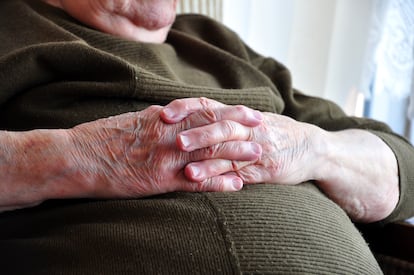Extra pounds could be beneficial for older adults, according to a study
Experts insist that body mass index isn’t everything; the key is to stay independent and preserve muscle mass


The body mass index (BMI) is a commonly used formula to assess health status. However, it has been faulted by many health professionals for not considering factors such as gender, age and physical activity. BMI is a person’s weight in kilograms (or pounds) divided by the square of height in meters (or feet). Anything outside the normal range (BMI 18.5-24.9) is deemed unhealthy. New research from the British Dietetic Association (BDA) indicates that being slightly overweight (BMI 25-30) could have health benefits for older adults.
Mary Hickson, co-author of a review of studies published in November 2023, explains that people between 70 and 80 years old have a lower risk of dying if they are slightly overweight, compared to younger age groups. “Factors like exercise play a more significant role,” said Hickson. This is called the obesity paradox, which implies that being overweight might be linked to longer lifespans for specific groups.
According to Naiara Fernández of the Spanish Society of Geriatrics and Gerontology (SEGG), the BMI normal ranges are based on results from young people. In older adults, a BMI between 28 and 30, which may indicate class 1 obesity in the young, would be considered normal in terms of weight.
Relying solely on BMI as an indicator of excess weight is a mistake, according to Jesús Román, president of the scientific committee of the Spanish Society of Dietetics and Food Sciences (SEDCA). An elderly person with a normal BMI may lack sufficient muscle mass, which negatively affects their health. This age group often experiences sarcopenic obesity, where body fat increases and muscle mass decreases. Conducting a comprehensive geriatric assessment is crucial, says Fernández.
When older people follow a restrictive diet to lose weight, not only do they lose fat, their muscle mass can also decrease. Román says this can make them more fragile, affect their mobility, and increase the risk of falls and injuries. Being slightly overweight can cushion and protect against bone fractures in case of a fall. For weight loss, it’s better to boost physical activity and burn more calories rather than cutting down on daily calorie intake. This advice comes from Jose Antonio Serra, head of geriatrics at the Gregorio Marañón hospital in Madrid.
According to Fernández, for a high quality of life, elderly people should strive to maintain independence, which requires having well-conditioned muscles. Consequently, he only recommends weight loss when mobility is affected by conditions such as hip or knee osteoarthritis, regardless of BMI. “We must focus on the things that help them stay healthy.” Being underweight and malnutrition also raise the risk of osteoporosis.
Serra says it’s important to know the dietary habits of older patients. “Sometimes, it’s not about eating too much, but rather not eating well that causes them to gain too much weight.” People living alone often face challenges with unhealthy eating habits, like limited access to quality protein, shopping difficulties, financial constraints, or lack of motivation to cook without anyone to share a meal. Fernández says these situations pose a health risk because they may result in consuming too many processed foods.
It’s also important to evaluate the distribution of body fat in each individual. According to Serra, if fat is evenly distributed throughout the body, it is “less harmful” than accumulated fat in the abdomen. In the latter case, there is a higher risk of developing metabolic syndrome, diabetes and heart disease.
Involuntary weight loss
The BDA study expresses concern about older people experiencing involuntary weight loss, which is considered more worrisome than being overweight. According to Hickson, this weight loss can be caused by factors such as social isolation, chronic disease, grief, depression, oral health problems, or medication that affects appetite, digestion or nutrient absorption. “To effectively plan appropriate care, we must diagnose malnutrition, identify its risks and evaluate the possible causes.” Fernández suggests a comprehensive approach involving various disciplines. This includes having a support person available, beginning a physical exercise program, and evaluating the elimination or substitution of medications with negative side effects. It’s also important to consider whether nutritional guidance or dietary supplements are necessary.
A study published in April 2023 in the journal Nutrients also supported the idea that older people who are overweight or obese live longer. The study argues that BMI is not the best measure because it doesn’t account for body composition and is less correlated with body mass percentage. It found that moderately overweight older individuals with chronic diseases or acute medical events tend to have better survival rates. The study also indicates that in older adults, a high BMI may indicate good nutrition and adequate muscle reserves.
Hickson believes it’s time to “review the evidence and consider WHO [World Health Organization] recommendations for all populations.” She suggests incorporating strength training to build muscle rather than focusing on weight loss for older people because it’s important to evaluate their nutrition as well. To understand the impact of obesity on health, we must examine factors like glycemic control, says Fernández. “It’s not about weight or a restrictive diet — we should focus on functionality and promoting physical exercise.”
Sign up for our weekly newsletter to get more English-language news coverage from EL PAÍS USA Edition
Tu suscripción se está usando en otro dispositivo
¿Quieres añadir otro usuario a tu suscripción?
Si continúas leyendo en este dispositivo, no se podrá leer en el otro.
FlechaTu suscripción se está usando en otro dispositivo y solo puedes acceder a EL PAÍS desde un dispositivo a la vez.
Si quieres compartir tu cuenta, cambia tu suscripción a la modalidad Premium, así podrás añadir otro usuario. Cada uno accederá con su propia cuenta de email, lo que os permitirá personalizar vuestra experiencia en EL PAÍS.
¿Tienes una suscripción de empresa? Accede aquí para contratar más cuentas.
En el caso de no saber quién está usando tu cuenta, te recomendamos cambiar tu contraseña aquí.
Si decides continuar compartiendo tu cuenta, este mensaje se mostrará en tu dispositivo y en el de la otra persona que está usando tu cuenta de forma indefinida, afectando a tu experiencia de lectura. Puedes consultar aquí los términos y condiciones de la suscripción digital.








































